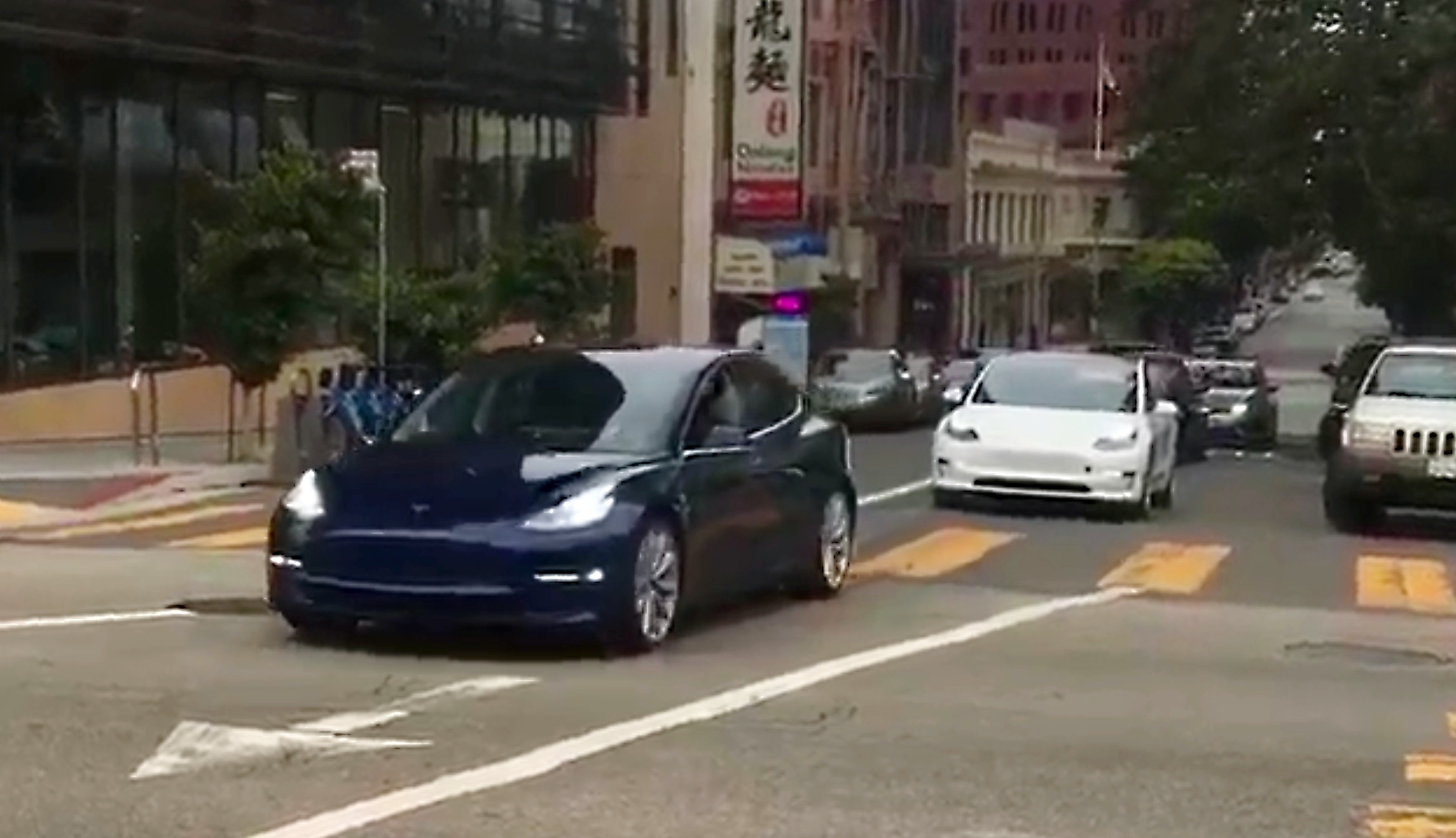Gene Munster, Loup Ventures cofounder, has equated the Model 3’s potential impact on the automotive industry to the iPhone’s effect on technology.
He said the Model 3 will “advance us to a new paradigm in transportation, car ownership, ride hailing, city development and energy usage,” according to TheStreet.
Munster also went as far as to compare Tesla to Amazon in an interview with CNBC, saying the core mission of Tesla will drive it through the current turbulence. He cited how skeptics underestimated Amazon when it was a mere book website, missing the grand vision of the company that allowed it and Jeff Bezos to become major players in the tech and sales industries.
It is certainly high praise from Munster, who is credited for his accurate predictions on Apple’s progress in the tech world.
But with the release of the Model 3 comes a pivotal point for Elon Musk: if the roll out goes off without a hitch, it could affirm confidence in both investors and consumers alike. With the emergence of turbulent stock news, wobbling quarterly profits and looming office harassment disputes, a botched roll out could be another major challenge for the company.
According to news.com.au, each Tesla release has required at least one recall — the Roadster for wiring, the Model X for parking brakes, and the Model S for seatbelts and airbags. While these recalls may not have been a deadly blow to Tesla at the time, Musk’s projections for the volume of the Model 3 means that something like a recall could become a major issue for the company.
In addition to the pressures of a perfect release, competition has heated up for Tesla with Volvo’s announcement earlier this week to produce 1 million electrified vehicles by 2025. While Musk — a proponent for sustainability whose actions are in part aimed at driving the entire industry forward — may invite this kind of jockeying, Tesla still needs to make money in order to keep leading the electric revolution.
So as Musk sits on one of the biggest phases in his company’s plan, Tesla’s future hangs in the balance. It’s clear that two camps are emerging: the Munsters of the world, who rest on the bedrock of Tesla’s mission, and the skeptics, who point to faltering stock prices and logistical mountains as Tesla’s plight.
As the world pushes toward electrified vehicles, carbonless energy and automotive efficiency, all eyes will be on Tesla — the driver of a sustainable future who some say could end up finishing last.
https://www.youtube.com/watch?v=2jH0mKovKuU

Investor's Corner
Tesla average transaction prices (ATP) rise in March 2025: Cox Automotive
Tesla Model Y and Model 3 saw an increase in their average transaction price (ATP) in March 2025.
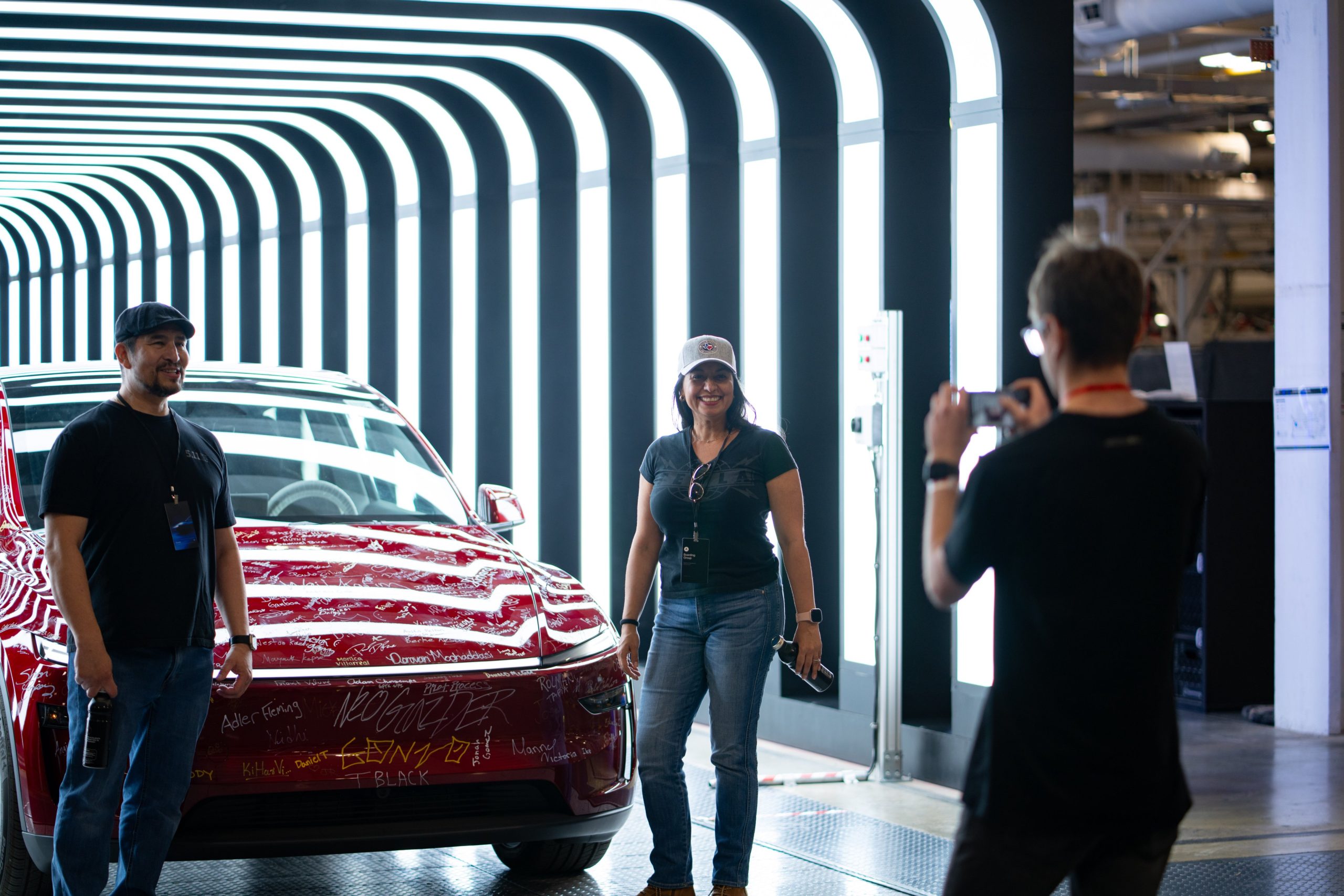
Data recently released from Cox Automotive’s Kelley Blue Book has revealed that electric vehicles such as the Tesla Model Y and Model 3 saw an increase in their average transaction price (ATP) in March 2025.
Cox Automotive’s findings were shared in a press release.
March 2025 EV ATPs
As noted by Cox, new electric vehicle prices in March were estimated to be $59,205, a 7% increase year-over-year. In February, new EV prices had an ATP of $57,015. The average transaction price for electric vehicles was 24.7% higher than the overall auto industry ATP of $47,462.
As per Cox, “Compared to the overall industry ATP ($47,462), EV ATPs in March were higher by nearly 25% as the gap between new ICE and new EV grows wider. EV incentives continued to range far above the industry average. In March, the average incentive package for an EV was 13.3% of ATP, down from the revised 14.3% in February.”
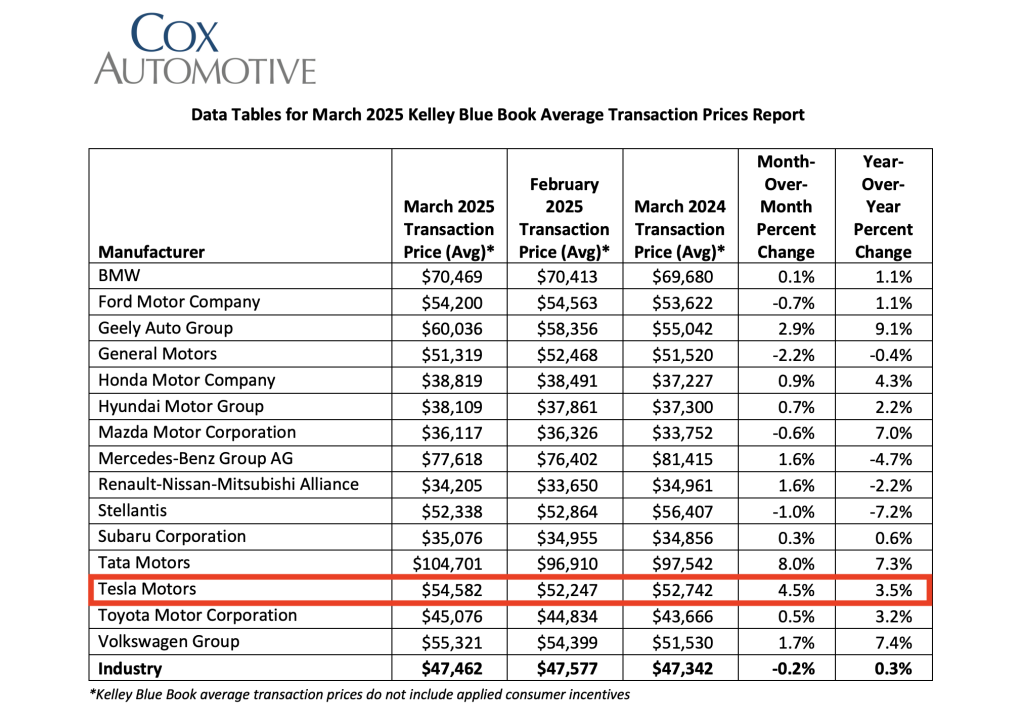
Tesla ATPs in Focus
While Tesla saw challenges in the first quarter due to its factories’ changeover to the new Model Y, the company’s ATPs last month were estimated at $54,582, a year-over-year increase of 3.5% and a month-over-month increase of 4.5%. A potential factor in this could be the rollout of the Tesla Model Y Launch Series, a fully loaded, limited-edition variant of the revamped all-electric crossover that costs just under $60,000.
This increase, Cox noted, was evident in Tesla’s two best-selling vehicles, the Model 3 sedan and the Model Y crossover, the best-selling car globally in 2023 and 2024. “ATPs for Tesla’s two core models – Model 3 and Model Y – were higher month over month and year over year in March,” Cox wrote.
Cox’s Other Findings
Beyond electric vehicles, Cox also estimated that new vehicle ATPs held steady month-over-month and year-over-year in March at $47,462, down slightly from the revised-lower ATP of $47,577 in February. Sales incentives in March were flat compared to February at 7% of ATP, though they are 5% higher than 2024, when incentives were equal to 6.7% of ATP.
Estimates also suggest that new vehicle sales in March topped 1.59 million units, the best volume month in almost four years. This was likely due to consumers purchasing cars before the Trump administration’s tariffs took effect. As per Erin Keating, an executive analyst at Cox, all things are pointing to higher vehicle prices this summer.
“All signs point to higher prices this summer, as existing ‘pre-tariff’ inventory is sold down to be eventually replaced with ‘tariffed’ inventory. How high prices rise for consumers is still very much to be determined, as each automaker will handle the price puzzle differently. Should the White House posture hold, our team is expecting new vehicles directly impacted by the 25% tariff to see price increases in the range of 10-15%,” Keating stated.
News
BYD launches premium Denza brand in the EU, unfazed by tariffs
BYD just rolled out its premium Denza brand, starting with the Z9GT. Despite EU hurdles, China’s top EV maker is going upscale in Europe.
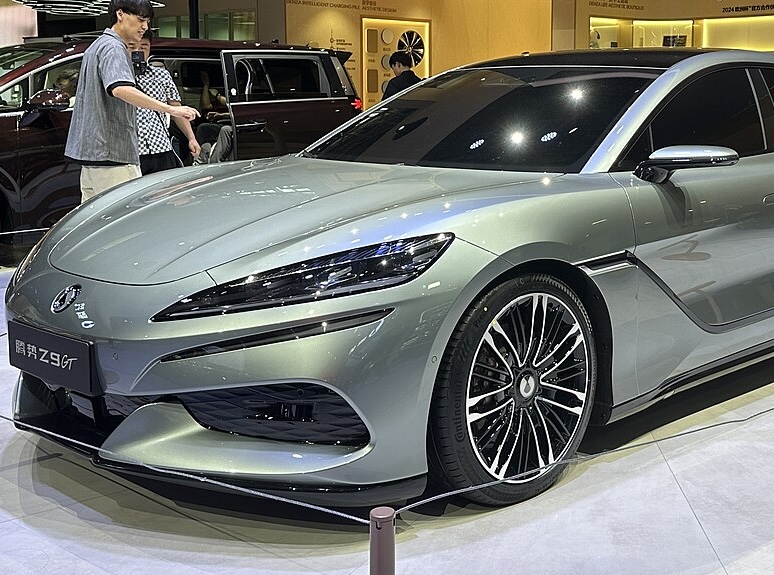
BYD launched its premium Denza brand in Europe, shrugging off tariff hurdles.
Chinese EV maker unveiled its plans for Denza on Wednesday at Milan’s Brera Design Week. BYD will launch its premium Denza line in Europe with the Z9GT in Q4 2025. The Z9GT is a station wagon-type vehicle.
BYD will offer battery-only and plug-in hybrid variants of the Denza Z9GT. The company did not release the pricing and exact delivery dates of the upcoming Denza vehicle.
The Chinese automaker will expand its Denza push with the D9, a seven-seat MPV, though BYD didn’t announce a timeline for its release.
“We’re thrilled to be introducing Denza to European customers, starting here in Milan and accelerating as 2025 progresses,” said Stella Li, BYD’s executive VP.
BYD’s European ambitions hit headwinds with the EU last year. In 2024, the EU slapped 17% duties on BYD’s battery EVs, citing “unfair” Chinese subsidies.
Last month, the EU initiated a probe into BYD’s Hungary plant. Subsidies allegedly let China-made EVs undercut Europe’s market, squeezing local players. Beijing and EU officials hashed out supply chain tensions in March, but tariffs persist.
BYD already sells electric vehicles in Europe. It is doubling down with Denza, targeting premium buyers amid a crowded field. Rivals like Volkswagen face stiffer competition as BYD leverages its cost edge—despite the EU’s pushback. The Z9GT and D9 signal BYD’s bid to carve out a high-end niche, even as trade friction simmers.
News
Bell Canada takes aim at potential Starlink subsidies
Details of Bell Canada’s anti-Starlink efforts were shared by the Financial Times (FT).
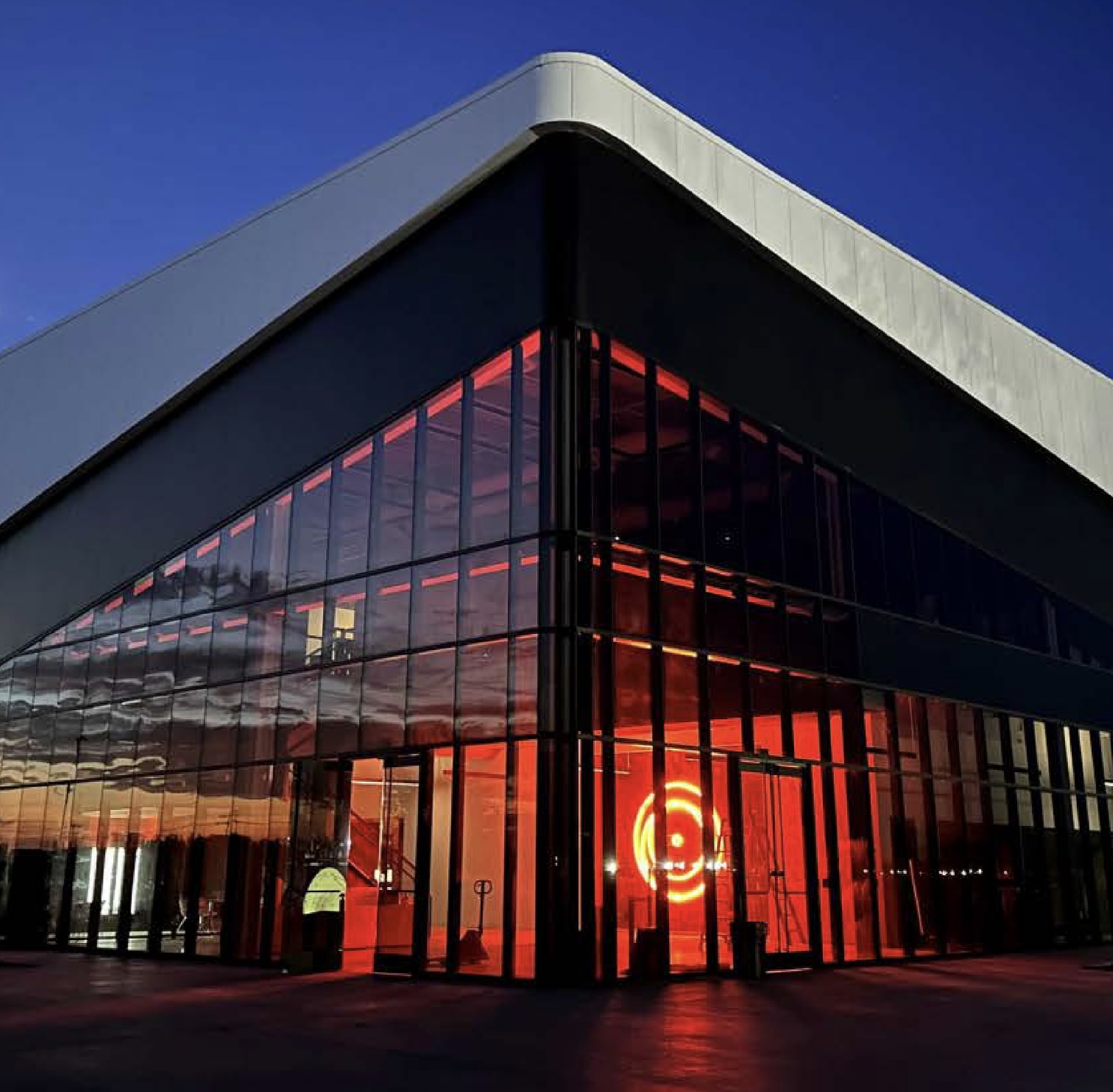
Tensions are rising in Canada’s telecommunications landscape as the nation’s leading telecom provider, Bell Canada, seeks to block Elon Musk’s Starlink from accessing potential subsidies.
Details of Bell Canada’s anti-Starlink efforts were shared by the Financial Times (FT).
Bell’s Push to Block Starlink Subsidies
As noted by the FT, Bell Canada and its subsidiary Northwestel are lobbying against potential subsidies that Starlink could receive for providing internet access to the country’s remote northern regions, including the Arctic. In correspondence obtained by the Times, Bell argued that Starlink’s flat pricing proves that it does not require support to operate in Canada’s remote areas.
A decision about the matter will be announced by the Canadian Radio-television and Telecommunications Commission (CRTC). That being said, the CRTC stated in January that a subsidy would help make “internet services more reliable and affordable for residents of the Far North.”
Starlink’s Defense
SpaceX, Starlink’s parent company, has fired back at Bell, stating that blocking subsidies would harm competition and leave isolated communities such as First Nations groups with fewer, more expensive, and less reliable internet options.
While Canada’s two biggest telecommunications groups, Bell and Rogers, still dominate the country’s internet and phone service market, Starlink has been making progress in its efforts to saturate the country’s remote regions. Starlink received official approval to operate in October 2022, and since then, it has grown its customer base to 400,000 active customers as of last year.
Musk’s Empire Under Fire in Canada
The subsidy clash is part of a broader Canadian backlash against Musk’s ventures, which seems to be fueled by his role in the Trump administration. Apart from Bell’s anti-Starlink efforts, Ontario also axed a $100 million Starlink contract. Quebec has noted that it would not be renewing its Starlink subsidy scheme as well.
Tesla, on the other hand, lost government EV subsidies, with Transport Minister Chrystia Freeland leading the charge. As per Geoff White of the Public Interest Advocacy Center, “We should not be giving one cent of public money to an unaccountable imperialist like Elon Musk.”
-
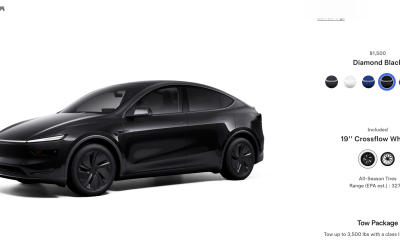
 News6 days ago
News6 days agoTesla rolls out new, more affordable trim of the Model Y Juniper in U.S.
-

 News1 week ago
News1 week agoTesla shares Optimus’ improved walk in new update video
-

 Elon Musk2 weeks ago
Elon Musk2 weeks agoTesla vandal who lit Las Vegas repair center on fire arrested
-

 Elon Musk2 weeks ago
Elon Musk2 weeks agoElon Musk clarifies Trump tariff effect on Tesla: “The cost impact is not trivial”
-

 News2 weeks ago
News2 weeks agoTesla US Gigafactories shields from Trump’s 25% Tariffs
-

 Elon Musk2 weeks ago
Elon Musk2 weeks agoMusk says xAI has acquired X in $33 billion stock deal
-

 Elon Musk1 week ago
Elon Musk1 week agoTesla Germany reports 4,935 units sold in Q1 2025
-
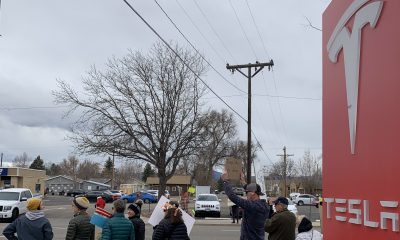
 Elon Musk2 weeks ago
Elon Musk2 weeks agoTesla vehicles hit by ATV, suspect caught by Sentry Mode
